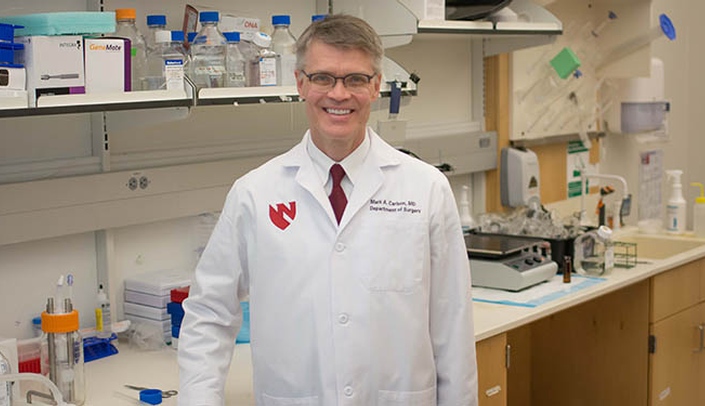Peripheral artery disease (PAD) is a serious problem. Basically, it’s the hardening of the arteries, which blocks blood flow to tissues and organs.
“When it happens in the heart, it can produce a heart attack,” said Mark Carlson, M.D., a surgeon-scientist who has a dual appointment at UNMC and the VA Nebraska-Western Iowa Health Care System. “When it happens in the brain, it can produce a stroke.”
When it happens in your limbs, it’s PAD. This blocking of blood flow can result in painful damage to the leg muscles affecting the ability to walk and in more severe cases, patients lose affected limbs.
But Dr. Carlson, with co-primary investigator Iraklis Pipinos, M.D., Ph.D., professor of vascular surgery, is working on a promising potential therapy. The UNMC scientists believe adult stem cells from a patient’s own fat biopsy can stimulate growth of blood vessels, improving blood flow.
Their work is funded by a five-year, $3.1 million NIH grant from the National Institute of Aging. PAD is most common among older folks — though it is common enough to affect 12 percent of the population overall.
Scientists’ enthusiasm 20 years ago about the value of adult stem cells to treat ischemic issues in the heart has since cooled because progress has been slow. Actual results in the clinic did not live up to the early excitement generated from benchtop and small-animal models.
But Drs. Carlson and Pipinos believe they now have a better model for testing the effectiveness of this type of cell-based treatment: a pig model.
Pigs’ biological systems are much more like humans’ than the small-animal models used previously.
“From a genetic standpoint, pigs are much closer to us than mice,” said Dr. Carlson, who is professor, surgery-general surgery.
“For example, the pigs that are used in this study will be fed a high-fat, high-sugar and high-salt diet that is quite similar to the diet many people in the western world consume. Furthermore, because of their larger size, the pigs allow injection of the adult stem cells in their leg in a fashion identical to that used in human patients.”
Investigators believe this model gives them the best chance to find a cell-based therapy to solve this problem, when previous projects could not.

Great work, Drs. Carlson and Pipinos! Thank you for your dedication to heart and vascular research.
Congratulations, Dr. Carlson and Dr. Pipinos!
Thank you for persevering and seeing a way forward.
Thank you for hope! Waiting for clinical testing.